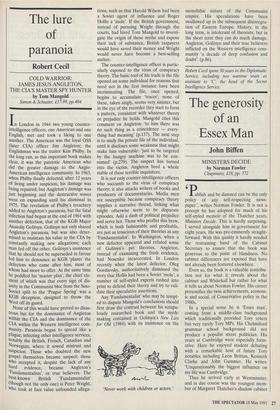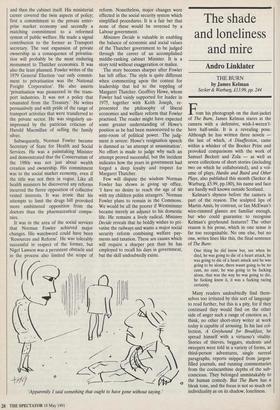The generosity of an Essex Man
John Biffen
MINISTERS DECIDE by Norman Fowler Chapmans, £18, pp. 372 Publish and be damned can be the only policy of any self-respecting news- paper', writes Norman Fowler. It is not a precept he has adopted for much of his self-styled memoir of the Thatcher years, Ministers Decide. This is hardly surprising. I served alongside him in government for eight years. He was pre-eminently straight- forward. With this quality it hardly needed the restraining hand of the Cabinet Secretary to ensure that the book was generous to the point of blandness. No cabinet differences are exposed that have not already been featured elsewhere.
Even so, the book is a valuable contribu- tion not for what it reveals about the cabinet and Whitehall but rather for what it tells us about Norman Fowler. His career personifies the twin achievements, econom- ic and social, of Conservative policy in the 1980s.
In a special sense he is 'Essex man', coming from a middle-class background which traditionally provided Tory voters but very rarely Tory MPs. His Chelmsford grammar school background did not produce a populist street politician. His years at Cambridge were especially form- ative. Here he enjoyed student debating with a remarkable host of future Tory notables including Leon Brittan, Kenneth Clarke and John Gummer. He writes: `Unquestionably the biggest influence on my life was Cambridge.'
Thus he arrived early at Westminster, and in due course was the youngest mem- ber of Margaret Thatcher's shadow cabinet and then the cabinet itself. His ministerial career covered the twin aspects of policy; first a commitment to the private enter- prise market economy and secondly a matching commitment to a reformed system of public welfare. He made a signal contribution to the former as Transport secretary. The vast expansion of private ownership as a consequence of privatisa- tion will probably be the most enduring monument to Thatcher economics. It was also the least planned. Fowler writes of the 1979 General Election 'our only commit- ment to privatisation was the National Freight Corporation'. He also asserts `privatisation was pioneered in the trans- port industries. It was not a policy that emanated from the Treasury.' He writes persuasively and with pride of the range of transport activities that were transferred to the private sector. He was singularly un- impressed by the patrician criticism of Harold Macmillan of selling the family silver.
Subsequently, Norman Fowler became Secretary of State for Health and Social Services. He was a painstaking Minister and demonstrated that the Conservatism of the 1980s was not just about wealth creation and ownership. His commitment was to the social market economy, even if the title was not then in vogue. Like all health ministers he discovered any reforms incurred the fierce opposition of collective vested interests. It was ironic that his attempts to limit the drugs bill provoked more embittered opposition from the doctors than the pharmaceutical compa- nies.
It was in the area of the social services that Norman Fowler achieved major changes. His watchword could have been `Resources and Reform'. He was tolerably successful in respect of the former, but Nigel Lawson was a persistent obstacle and in the process also limited the scope of reform. Nonetheless, major changes were effected in the social security system which simplified procedures. It is a fair bet that none of these would be reversed by a Labour government.
Ministers Decide is valuable in enabling the balance of economic and social values of the Thatcher government to be judged through the career of an accomplished middle-ranking cabinet Minister. It is a story told without exaggeration or malice.
The story becomes sharper after Fowler has left office. The style is quite different when commenting upon the contest for leadership that led to the toppling of Margaret Thatcher. Geoffrey Howe, whom Fowler had vainly supported for leader in 1975, together with Keith Joseph, re- presented the philosophy of liberal economics and welfare reform that Fowler practised. The reader might have expected some greater understanding of Howe's position as he had been manoeuvred to the ante-room of political power. The judg- ment is severe: Howe's resignation speech is damned as 'an attempt at assassination'. No effort is made to judge why such an attempt proved successful, but the incident indicates how the years in government had forged a deep loyalty and respect for Margaret Thatcher.
Few will dispute the wisdom Norman Fowler has shown in giving up office. `I have no desire to reach the age of 60 with my children polite strangers.' Norman Fowler plans to remain in the Commons. We would be all the poorer if Westminster became merely an adjunct to his domestic life. He remains a lively radical. Ministers Decide reveals that he boldly wishes to pri- vatise the railways and wants a major social security reform combining welfare pay- ments and taxation. These are causes which will require a sharper pen than he has employed to recall his days in government, but the skill undoubtedly exists.
`Apparently I said something that ought to have gone without saying.'



























































 Previous page
Previous page